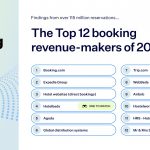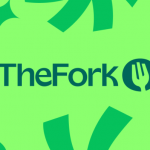Travel is back. Room rates are returning to the 2019 level, with occupancy at its highest in years.
NB: This is an article from The Hotels Network, one of our Expert Partners
Based on the latest research, nine in ten people plan to travel within the next six months. Moreover, inbound international travel to the United States is returning. Nearly 100% of companies are traveling now, or planning to start traveling soon. Group demand that was slow at the beginning of the year is picking up, with things looking up in the middle of summer of 2022.
Subscribe to our weekly newsletter and stay up to date
The result of this return of travel? Hotel teams are busier than ever. The need to do more with less has never been greater, as the marketing and revenue teams beg ownership for additional associates to just keep up with the day-to-day demands of their jobs.
Forget getting ahead and being strategic, everything seems reactive, and teams must address the demands of the moment. Unfortunately, this short-sighted perspective, while critical to keep up with the overwhelming surge hotels are facing, is pushing the marketing and revenue teams to their limit. They cannot see or plan for what will follow the summer surge, which is scary. According to economists, 70% expect a recession by the end of 2023. So, while it makes logistical sense for owners to keep internal resources low, what can hotel marketing and revenue teams do now to prepare for the pending recession?
1. Work with your reduced media budget
In a recession, one of the first line items to get cut is the media budget, which ultimately starts the downward spiral of direct channel website production. Moreover, with the increase in zero-click searches (searches performed on Google’s search engine that gives guests the information they desired on the search engine results page), people aren’t even organically reaching the hotel website. A recent study by Rand Fishkin of SparkToro placed the number of zero-click searches at around 65%. Therefore, the tag-team of reduced media budgets, combined with the ever-increasing number of zero-click searches that will never reach your hotel website, will drastically reduce direct channel traffic.
2. Understand your relationship with OTAs
As a result of this drop in top and middle funnel hotel searchers, hotels will become significantly more reliant on online travel agencies (OTAs) such as Expedia and Booking to keep rooms filled. The sacrifice of driving guests to the hotel’s direct channel and relying on the OTAs will further reduce the GOP of hotel owners, as they are forced to pay out larger commission checks to the OTA. This is unfortunate, because there are simple steps every hotel can take right now to help recession-proof their website and not lose a larger share of their direct channel reservations.
The natural question is, what are these simple steps that can be taken if this is the expected cycle? What can realistically be done that is easy, fast, and will truly move the needle?
When I was a hotelier during Covid, my budgets were slashed and I felt impotent to move the needle. I had to rely on the OTAs to drive production, and I was only updating website content to provide covid related messaging. Yet, I discovered a solution that truly helped reclaim direct bookings.
3. Personalize the website user’s experience
Utilizing conversion and personalization on the brand and hotel websites resulted in an uptick in conversion, even as media budgets were cut. This type of success was part of why I chose to transition my career from marketing at hotels, to helping hotels market themselves better on their direct channel with The Hotels Network.
If hotels cannot attract guests directly to their hotel website via paid or organic search, they can still expect that guests will follow the same habits they have when they commence a new booking.
Typically, guests start on the OTA to narrow down three or four hotels that seem to meet their needs. At this point, the guest usually heads to the hotel website to get a better feel for the experience they can expect from the hotel. This moment is probably one of the greatest opportunities to channel shift and convert the OTA customer to a direct channel customer. The hotel website needs to showcase:
That its prices are in parity with the OTA (This removes the guest’s impression that they are getting a better deal on the OTA).Additional perks that are exclusive to the guest if they book direct.Personalized messaging that positions themselves as a good fit for the guest’s needs and recognizes the person by location, search and browse dates.Encouragement for the guests to book on the hotel website first, and ask their partner later (versus ask then book), by delivering urgency messages associated with special offers and countdown timers.Exit messages that try one last time if they sense the website visitor will abandon the page, with an attractive perk or an exclusive offer to secure the booking.
Naturally, the main concern from the marketing and revenue teams is the amount of time it will take to implement this incremental conversion recession-proof technology. If they don’t have time to think about the next month’s strategic actions, how can they possibly start exploring new technologies? However, this type of technology is the easiest to install on a website and booking engine because it’s just a simple script that is part of Google Tag Manager. The biggest effort of the hotel is to find the person with permission to install the Google Tag Manager scripts on their website. After this process, which can be completed in just five minutes, the effort shifts to the company supporting the conversion and personalization initiatives on behalf of the hotel.
4. Test to find the best solution
With minimal implementation time, why do hotels continue to drag their feet in installing recession-proof technology on their website? Apart from not being aware that technology like this exists, there might still be a doubt that a solution can really move the needle during a recession. To this point, the hotel needs to ask for a risk-free A/B test of the solution. This test will prove that conversion and personalization technology drives significantly high ROI, even before the recession.
If hotels act now to start their A/B test, by the time the summer surge begins to subside they will be positioned well to drive revenue that they would have lost with their impending media budget cuts.
5. Benchmark to see how your stack up against competitors
Even if hotels choose not to install this type of technology, there is another solution for hotels to monitor their success against their competition as the recession begins to take hold. This is through benchmarking their direct channel performance. Keeping their finger on the direct channel’s pulse will allow hoteliers to steer through the recession, and come out in an even stronger position than their competitors. With a free benchmarking solution like BenchDirect and a low-cost conversion/personalization solution like The Hotel Networks’s Conversion and Personalization platform, hotels can take the necessary steps today to recession-proof their website.
Read more articles from The Hotels Network
The post Is Your Hotel Website Recession Proof? appeared first on Revenue Hub.































